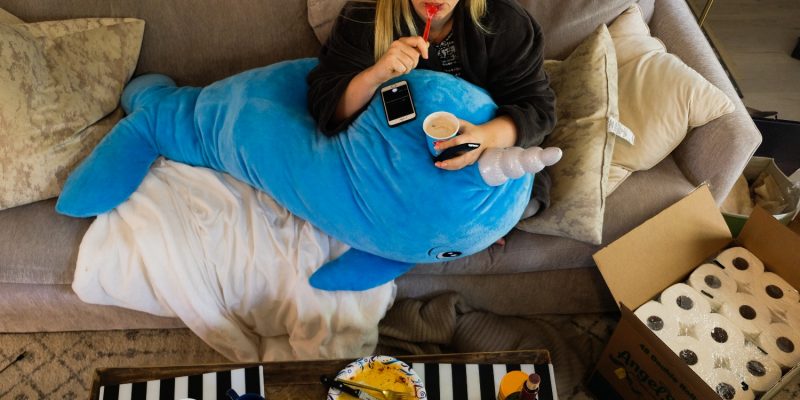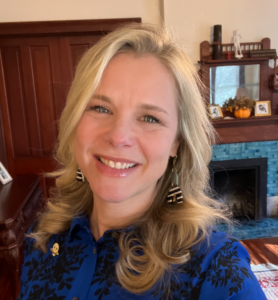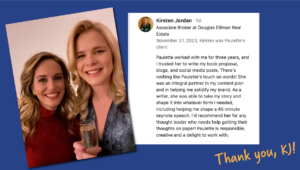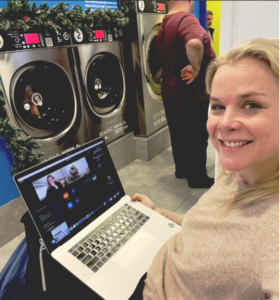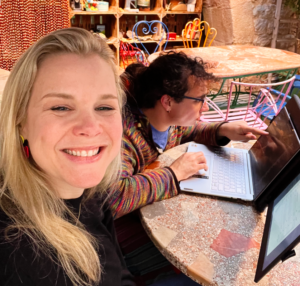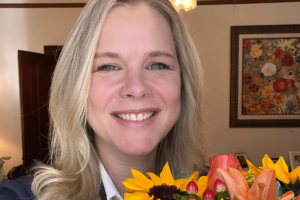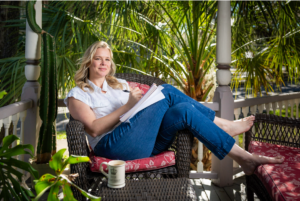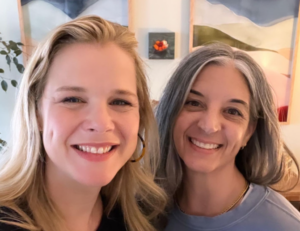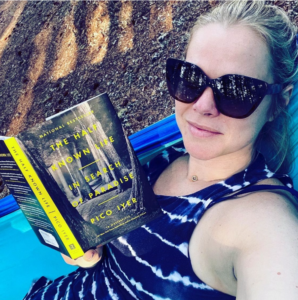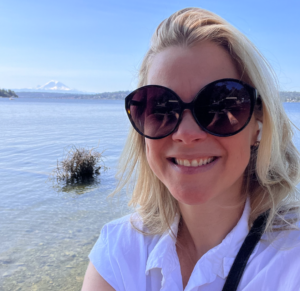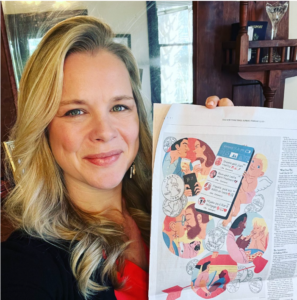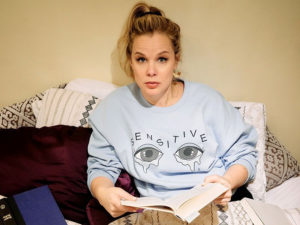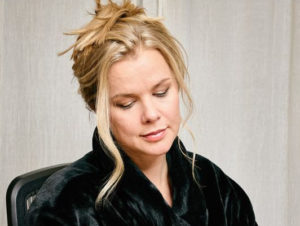What Is It You Plan to Do with Your One Wild and Precious Quarantine? You do not have to say “I should…” You do not have to pull on hard pants, nor any To sprawl in the you-shaped couch pit, app-hopping. You only have to let the ever-softer animal of your body Snack what it snacks. Tell me about your loungewear, ramen noodles dried on mine. Meanwhile, you glue googly eyes on Robovac Ralph, Meanwhile, time’s hourglass of dust gathers on craft books and that pull-up bar And the cardboard box pile would make a sweet office fort if you could only… nah. But you’ll watch that Savory Vegan Pies class that expires this week as soon as you beat one more level. Meanwhile, that wild beast, the you in night windows, blooms body hair again. Whoever you were, no matter how functional, Quarantine gives you all the time, but none of the will, The finished manuscript on someone else’s Instagram. You only pause after today’s poop/cry to clap for Ralph as he finally surmounts the rug corner, then open your phone, to tweet about it.
So you weren’t very productive during a pandemic
I wrote this ode to quarantine life, a nod to Mary Oliver’s Wild Geese, after seeing its most famous line on the back of my door.
Though the person who posted it there left out the wild, I still didn’t like the answer provided by the snapshot of myself in that moment. What did I plan to do with my one precious life? My very existence in that moment answered: to mope in my own un-showered filth, wrapped in an oversized robe, getting Cheetos dust all over my phone screen while scrolling through a slideshow of beautiful strangers who made me feel like a 6′ tall slothwoman.
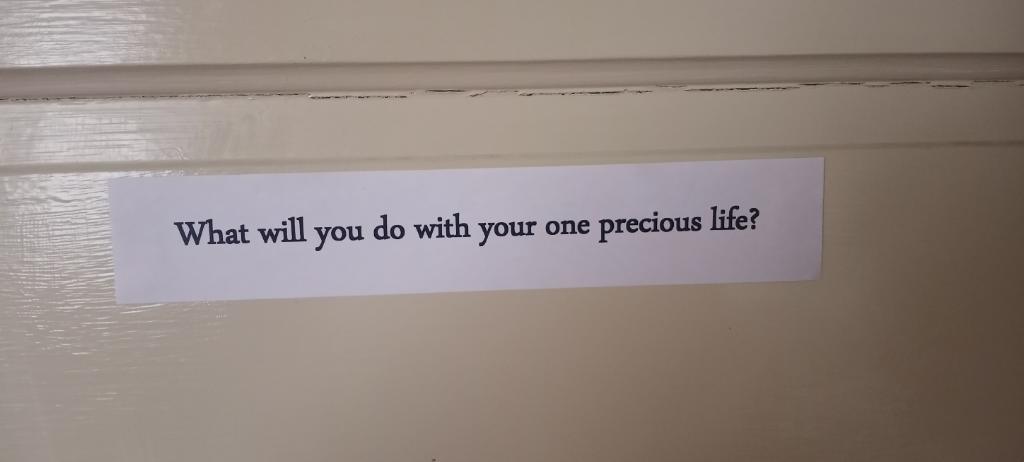
“What is it you plan to do with your one wild and precious life?”
Yes, quarantine was part of my precious life. No, I did not really succeed at treating it that way.
After getting vaccinated, I want to get back in the game Living, not just existing. In the words of a wise 8-year-old, “I don’t want things to go back to normal. I want things to go back to better.”
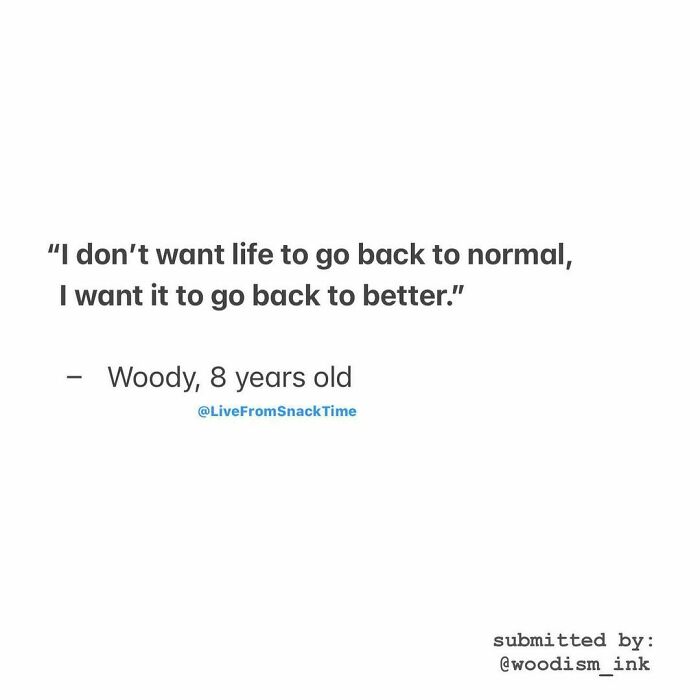
That child’s phrasing reminds me of a wonderful article I read about something I hadn’t heard of before: post-traumatic growth.
The author, psychologist Richard G. Tedeschi, comes bearing good news, that we can shape our response to this tragedy and use it to live more deeply and find our way back to being the writers we want to be.
5 ways to turn trauma into growth
Psychologists have identified a handful of key places to focus in order to get back up from one of life’s sucker punches.
1. Tell yourself a new story
As a writer, I love this: Telling a new story about your quarantine experience can help you gain control of its outcome.
As you might know, most plots begin with something happening to the character, but from then the character’s decisions drive the story. You can write your own future of how you’ll react to what’s happened. You can reclaim agency.
For example, I hated how much time I spent on social media over the last year. So I decided to take a year off social media scrolling. I wrote a story about my life that said I spent a year in a near-fully digital world, and I wanted to spend a re-calibrating year in a near-fully analog one.
Tedeschi suggests asking, “How has [the trauma] caused you to recalibrate your priorities? What new paths or opportunities have emerged from it?”
2. Educate yourself on what you’ve been through.
Here’s a hint: You’ve been traumatized.
We all have stories about how we didn’t have it as bad as our one friend or our neighbor during the pandemic. We didn’t lose our lives, as 3 million people have. But we have to get real about one thing. We all went through a trauma.
The author of the HBR article defines trauma as “a disruption of core belief systems.” As someone who watched President Donald Trump suggest we might inject bleach to get rid of the plague that shut down the entire United States, I would say that accurately describes my experience.
But the key is also to know that even though no one but a narcissistic plexiglass executive would have chosen for this to happen, the extremely negative circumstance can lead to brighter things in the future.
3. Regulate your emotions
This is fancy talk for try to not freak out. Catch yourself in the worst-case scenario or regret thinking, spiraling with what is outside of your control. Re-focus your thoughts on the possibilities and what’s within the area you can influence.
When you’re in fear thinking, your consciousness curls up inside your fight or flight limbic system. That is not where creativity lies. The more calmly you can respond to the situation you’re in, the more creatively you can respond to it, too.
4. Talk it out
Talking about how your quarantine felt like, what you experienced and what you lost can help you process the emotions so you don’t just try to eat or spend them away. When you say your story out loud, you might re-hear it and truly understand how hard it’s been, creating some empathy for yourself.
Deeply conversing with our fellow humans, especially ones we haven’t seen in a long time, can help us rekindle the bonds of friendship we might feel have loosened.
5. Serve others
Service is a great antidote to loneliness. It can be as simple as sending a text asking how someone is, spending money at a friend’s business, or making a $5 a month donation to a homeless shelter.
I was very much in victim mode when quarantine started. I didn’t have anything to give anyone. As I’ve written about, a free online dance class helped me snap out of it and ask how I might serve writers. That led to starting my meditation and writing group, and that has really been the light of my last year.
Onward, better than before
Just exactly how might you grow and become a better you in the face of all this?
- Proven strength: You’ll have more confidence in yourself to handle whatever comes your way in the future.
- New possibilities: If quarantine dismantled your life, you can rebuild it in ways you might not have seen before.
- Improved relationships: I know I’ve felt so damn grateful for my friends, and I feel like I won’t take them for granted as much in the future. Plus, my roommate, who was a stranger to me at the start of the last year, is now pretty much on bestie status.
- Appreciation for life: Do you know how amazing a concert is going to feel? This is an effect I remember from the Peace Corps. Everything we’ve been deprived of over the last year will reveal itself as even more precious.
- Spiritual growth: You’ve had lots of time to contemplate the deeper questions, and we’ve all been confronted with mortality. Chances are you’ll come out of this with a deeper view of life that will resonate in your work.
The last year was not pretty. For anyone. If you’re feeling uninspired, if you feel like you wasted the last year, if you feel lost, it’s not you.
But you do have control of what you make of it. Deep breaths. Let’s put on hard pants, and let’s go.

